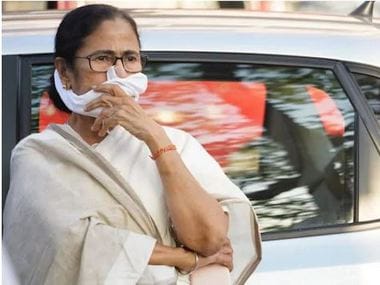In chief ministers meeting with the Prime Minister Narendra Modi, West Bengal Chief Minister Mamata Banerjee accused the Centre of being “anti-federal and partisan against Bengal”. Her anger was predictable as she has been attempting hard to build this narrative for the last six years to hide her own failure in ruling the state.
The fact that she didn’t find support on this count from other chief ministers, to be more specific from the other non-BJP, non-NDA ruled states is indicative that there was not much substance in her accusations. West Bengal’s handling of coronavirus pandemic has been non-transparent, to say the least.[caption id=“attachment_8299581” align=“alignleft” width=“380”]  File image of Mamata Banerjee. Image courtesy News18 [/caption] It should be noted in the last 50 days Modi has held five meetings with chief ministers discussing ways and means to fight the novel coronavirus and deliberate on mechanisms to reduce the transmission rate of the disease on the one hand and on the other to gradually resume public and economic activity without diluting social distancing guidelines. Monday’s meeting was fifth such meeting and it continued for about six and a half hours. That by itself is an indicator that the Centre and states are working in close coordination. Individual states may have a grievance on a given issue but that’s legitimate and excepted, there can’t be a sweeping generalisation like Mamata sought to portray. Unlike the United States of America, federalism has its own meaning in India. Since school days one is taught, rightly so, that India is quasi-federal state, more of a unitary than federal in nature. Role of leadership comes into play here. Modi’s USP is three-fold, his leadership, ability to deliver goods on the ground and his direct connect with the masses. It is true that the decision to announce national lockdown on the evening of 23 May was unilateral. It had to be so. The Centre came out of a series of guidelines on lockdown and social distancing norms, amending and revising them as days passed by and emerging situations required. From then onward the directives issued by the Union Ministry of Home Affairs on lockdown have incorporated suggestions made by the states. The Centre, of course, had to exercise its own wisdom and discretion on certain issues. The other way to look at it is the fact that it was not possible to have unanimity amongst all the states on a given issue. But one must give credit to the states (barring the exception of West Bengal), they have had reservations on an issue but once the directive was issued by the Centre they implemented it. The fact that even as deliberations of Monday’s meeting was duly recorded Modi asking the chief ministers to share a broad strategy “on how you each one of you would want to deal with the lockdown regime in your particular states….. I want states to make a blueprint on how to deal with various nuances during and after the gradual easing of the lockdown”, is yet another example of how ‘cooperative’ federalism at play in India. It also gives a sense that in Lockdown 4.0 which may come into force from next week may give larger role or discretion to the states to decide on the nature of lockdown and resumption of public and economic activities. One of the benefits of centrally driven lockdown mechanism has been uniformity of response by the states, or India as a nation and both officials and public at large at district and block levels broadly understood standard operating norms. Now could be the time to relax the hitherto centrally driven approach. It is this context that Modi’s words to chief ministers, “I am of the firm view that the measures needed in the first phase of lockdown were not needed during the second phase and similarly the measures needed in the third phase are not needed in the fourth”, become even more significant. One of the key things that would be watched closely when Centre announces guidelines for Lockdown 4.0 is whether the classification of red, orange and green zone districts would be done by the Centre or it will devise fresh guidelines for containment zones and leave it to the states to decide on the classification of zones and accordingly resumption of public activities. The other manifestation of federal spirit and close cooperation of the states with Centre comes from Modi’s remark on the way “world has fundamentally changed post COVID-19” and just like in case of world wars, the world will be “Pre-Corona, Post-Corona”, and the challenges and opportunities it presented. India can’t move forward the way it desires in changed social and economic conditions without a unified national resolve to do so. The changes that post-Corona situation entails is not just about how offices and business and economic hubs functioned but also the way Centre and states in India functioned. Modi’s new slogan “Jan Se lekar Jag Tak” has to be seen as India’s yearning to be in a leadership position in the soon to be changing world order.


)

)
)
)
)
)
)
)
)



